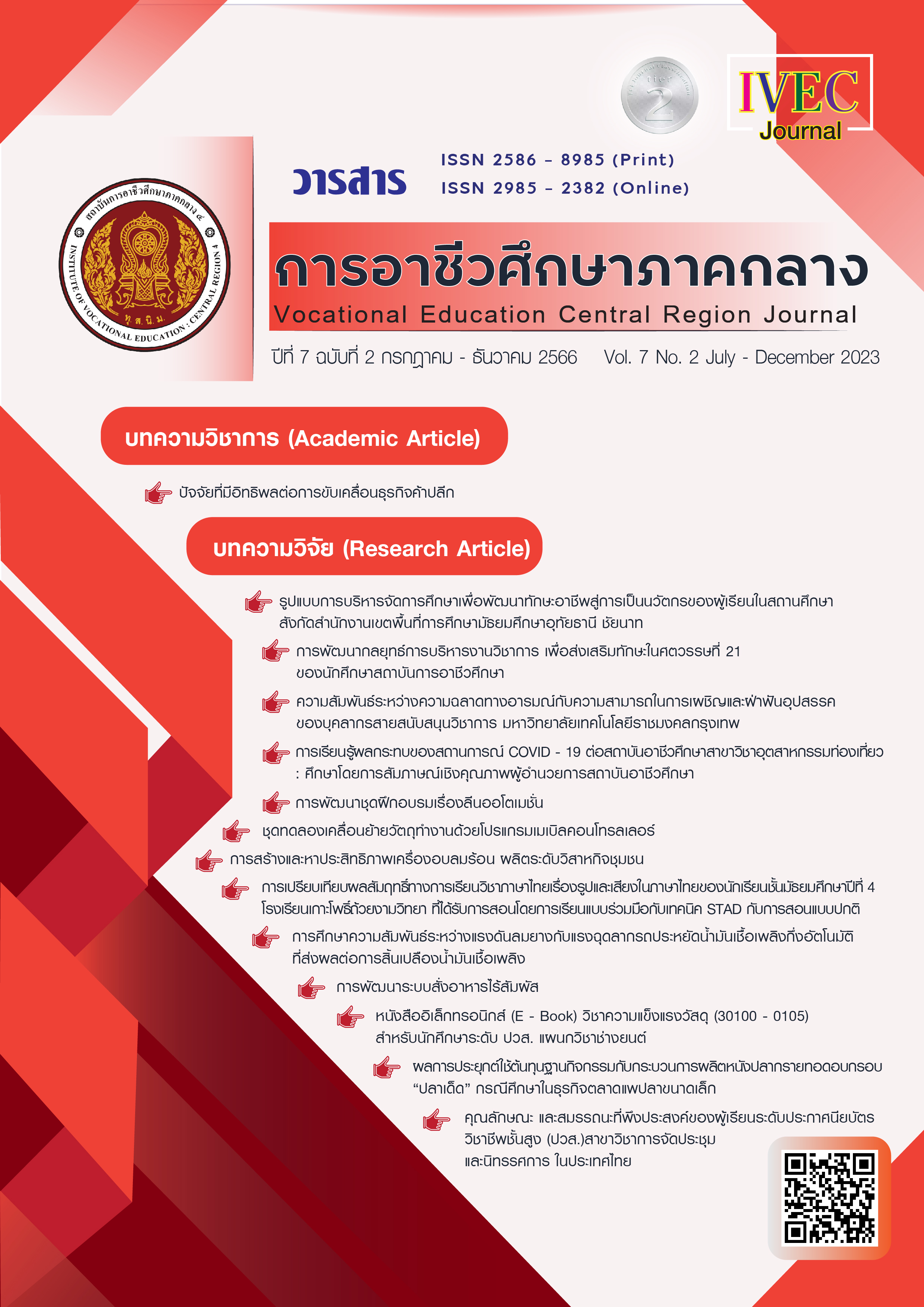A Study of the Impact of COVID - 19 on Vocational Institutes in Tourism Industry Program : Qualitative Interview Study of TVET Directors
Main Article Content
Abstract
COVID -19 Pandemic affects the Thai education system greatly. Especially , education that requires teaching and learning in real places such vocational education. This research therefore focuses on studying the impact of the COVID - 19 outbreak towards vocational education in the area that directly affected such as tourism and hospitality courses. We study the changes in teaching methods and the limitations, limitations on Internship , and job searching in affected occupations. We conducted in - depth interviews with directors or appointed teachers of 8 TVET institutions throughout Thailand. The criteria for selecting vocational institutes are as follows : 1) public and private vocational institutes ; 2) location by regions and Bangkok ; and 3) vocational institutes with the high number of students studying in tourism program. The results of this study found that. This study found that public and private vocational institutes are affected on different degrees , in terms of the limitation on learning materials, inability to get training during internship , and issues related to family income affect education and future career greatly. Graduated students are unable to find a job that matches the subjects they studied, so they ended up selling products online or do farming with their families. As for new students , they lack confidence in the field of tourism and hotel industry causing the number of students in this field to decrease. TVET institutions provide some support measures such as reducing registration fees. Other supports measures depend on the financial situation of each institution. Ones with more cash flow can offer students to study first and pay tuition fees when they graduate. This approach is the concept as students borrowing money from the institution to study.
Article Details

This work is licensed under a Creative Commons Attribution-NonCommercial-NoDerivatives 4.0 International License.
|
บทความ ข้อมูล เนื้อหา รูปภาพ ฯลฯ ที่ได้รับการตีพิมพ์ในวารสาร การอาชีวศึกษาภาคกลาง ถือเป็นลิขสิทธิ์ของวารสารการอาชีวศึกษาภาคกลางหากบุคคลหรือหน่วยงานใดต้องการนำทั้งหมดหรือส่วนใดส่วนหนึ่ง ไปเผยแพร่ต่อหรือเพื่อกระทำการใด ๆ กองบรรณาธิการไม่สงวนสิทธิ์ ในการคัดลอกบทความเพื่อการศึกษาแต่ให้อ้างอิงแหล่งที่มาให้ครบถ้วน สมบูรณ์ สงวนสิทธิ์ โดย สถาบันการอาชีวศึกษาภาคกลาง 4 ที่ตั้ง 90 ถนนเทศา ตำบลพระปฐมเจดีย์ อำเภอเมือง จังหวัดนครปฐม โทรศัพท์ 034 242 856 , โทรสาร 034 242 858 ISSN : 3056-9176 (print) ISSN : 2985-2382 (online) |
References
British, C. (2021). How are vocational institutions innovating, evolving and changing as a result of Covid - 19?. Retrieved December 10 , 2022 , from https://www.britishcouncil.org/sites/default/files/how_are_vocational_institutions_innovating_evolving_and_changing_as_a_result_of_covid-19_report.pdf
German Office for International Cooperation in Vocational Education and Training (GOVET) (Eds). (2022). Effects of the COVID - 19 Pandemic on Vocational Education and Training: International Perspectives of Policy Makers and Practitioners. Germany: Federal Institute for Vocational Education and Trainning.
Masina, R., & Mawonedzo, A. (2022). The impact of COVID - 19 pandemic on TVET students' learning process: a case of one polytechnic college in Harare. South African Journal of Higher Education, 36, (4), pp. 101 - 116.
UNESCO and Omnia Education Partnerships. (2021). Case Study on Finnish TVET: A Resilient Model of Training During COVID - 19. Retrieved December 10, 2022, from https://unesdoc.unesco.org/ark:/48223/pf0000375471
World Bank Group. (2020). The Impact of COVID - 19 Pandemic on Education Financing. Retrieved December 10, 2022, from https://thedocs.worldbank.org/en/doc/734541589314089887-0090022020/original/CovidandEdFinancefinal.pdf
World Bank Group. (2020). TVET Systems’ response to COVID - 19: Challenges and Opportunities. Retrieved August 10, 2023, from https://documents1.worldbank.org/curated/en/930861589486276271/pdf/TVET-Systems-response-to-COVID-19-Challenges-and-Opportunities.pdf


